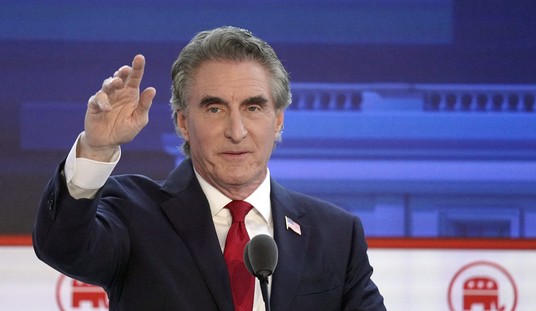
Kobe Bryant and his daughter Gianna watch the first half of an NCAA college basketball game between Connecticut and Houston, Saturday, March 2, 2019, in Storrs, Conn. (AP Photo/Jessica Hill)
Within hours of the announcement that Kobe Bryant had been killed in a helicopter crash, Washington Post reporter Felicia Sonmez tweeted a link to a story about accusations Bryant raped a woman in 2003. She defended herself by claiming some journalistic responsibility to ensure that people didn’t gloss over the bad parts of the NBA superstar’s life. Other reporters, pundits, and laypeople shared their view that they couldn’t mourn “a rapist” or that it would be irresponsible to leave any mention of the incident out of the discussion.
Does anyone really think people needed to be reminded that Kobe had been accused of rape? Kobe himself knew that when he died that chapter of his life would figure prominently. From a 2015 GQ interview:
“But the incident will (obviously) never go away. When Bryant dies, the accusation will probably appear in the second paragraph of his obituary. And he knows this.”
Something as life-altering and traumatic as rape should never be minimized or brushed aside, and the specific incident should not be ignored as part of Kobe Bryant’s life. That incident, though, is not the totality of Kobe Bryant’s life. To those who hold the view that Bryant should not be mourned at all or that his other accomplishments in life should be ignored, I ask you to consider the place of redemption in our lives. Is redemption available to all, or just a select few? Is there a limit to the number of times one can seek forgiveness in their lives?
I wholeheartedly agree with the sentiment my friend Sarah Smith shared Monday morning:
“If you don’t believe in redemption for others you will never have it for yourself.”
Redemption requires an admission of wrongdoing and restoring what was broken (as far as it is possible). Kobe admitted that he had a sexual encounter with his accuser but he believed it had been consensual. On September 1, 2004 Bryant issued an apology to her for his behavior, and also said that after listening to her testimony in person he “recognize[d] now that she did not and does not view this incident the same way I did.” Hopefully the young woman he hurt has been able to find peace and move on with her life; she likely doesn’t want her life focused on that moment in time either.
After publicly admitting that he committed adultery, he also had to work to restore his marriage. His wife filed for divorce in 2011, but the two reconciled 13 months later. In the 2015 GQ referenced earlier he said he was determined to put in the work needed to save his marriage partly because of the effect a divorce would have on his children.
“I’m not going to say our marriage is perfect, by any stretch of the imagination,” Kobe says. “We still fight, just like every married couple. But you know, my reputation as an athlete is that I’m extremely determined, and that I will work my ass off. How could I do that in my professional life if I wasn’t like that in my personal life, when it affects my kids? It wouldn’t make any sense.”
By the time of his jersey retirement ceremony in 2017 he thanked her for being “an inspiration.”
‘It’s not the destination, it’s the journey… if you guys can understand that, then I’m doing my job as a father.’ — Listen to the powerful message Kobe Bryant shared with his family at his jersey retirement in 2017 pic.twitter.com/4T8ve1rllj
— NowThis (@nowthisnews) January 28, 2020
On numerous occasions Kobe credited his faith and spiritual guidance from his priest for giving him the strength to change his life after such a major transgression. In a 2006 interview he said that the experience taught him that “God is great. It don’t get no simpler than that.”
The interviewer, Stephen Smith, remarked that yeah, we all know God is great, then asked Kobe, “The way you know it now, did you know it before that incident took place?”
Kobe Bryant from an interview in 2006- “Until you got to pick up that cross that you can’t carry, and He picks it up for you and carries you and the cross, then you know”. pic.twitter.com/iJrFXjpVMP
— Greg Laurie (@greglaurie) January 28, 2020
His reply:
“You can know it all you want, but until you’ve got to pick up that cross that you can’t carry, and He picks it up for you and carries you and the cross, then you know.”
Without the ability to be redeemed, to be able to go forward in life, there would be no point in living after committing a serious transgression. While few people’s sins are as grievous as the ones Kobe admitted to, we are all imperfect beings who have probably needed a second chance at one time (or more) in life. As Kobe’s emotional testimony shows, the more serious the transgression, the more one values the gift of redemption.
My friend Kassie’s thoughts on the matter struck me. Referencing Oscar Wilde, she wrote:
I admire Kobe Bryant, not for his amazing athletic skills, but for his redemption story. He repaired his life – and he and his wife repaired their marriage when everything seemed to be lost. It took a lot of work, a lot of forgiveness, a lot of tears, I’m sure.
‘Every sinner has a future and every saint has a past.’ Kobe and his wife made a decision to help one another get to heaven…That’s a story of hope.
Yes, Kobe Bryant was far from perfect. His legacy is complicated, sure, but at its core is one of redemption, forgiveness, and hope.














Join the conversation as a VIP Member